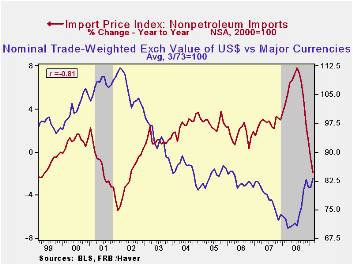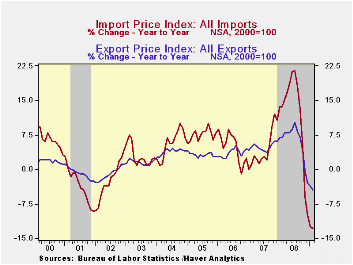 Global| Mar 13 2009
Global| Mar 13 2009U.S. Import Prices Move Lower Despite Higher Oil Prices
by:Tom Moeller
|in:Economy in Brief
Summary
U.S. import prices fell another 0.2% during February, dragged lower by the worldwide recession. The generalized decline, which offset the influence from higher oil prices, followed a little-revised 1.2% January drop. During the last [...]

U.S. import prices fell another 0.2% during February, dragged lower by the worldwide recession. The generalized decline, which offset the influence from higher oil prices, followed a little-revised 1.2% January drop. During the last twelve months, the 12.8% decline in import prices was the quickest in the series' history which dates back to 1983. February's figure fell short of Consensus expectations for a 0.7% drop.
Last month, petroleum prices firmed by 3.9%, reversing their January decline. This month, the average cost of $43.78 per barrel of Brent crude is even higher than the February level.
Offsetting that upturn in oil prices last month was a 0.6% drop in nonoil import prices. These prices have fallen during each of the last seven months and are down 6.3% during that period.Through early March, the foreign exchange value of the dollar rose 21.0% versus its year-ago level and further reduced the pressure on U.S. import prices. During the last ten years, there has been a negative 81% correlation between the nominal trade-weighted exchange value of the US dollar vs. major currencies and the y/y change in non-oil import prices.
February capital goods import prices slipped 0.4%. On a three-month basis, prices fell at a 2.6% annual rate after 5%-to-6% rates of increase during early 2008. Excluding the lower prices of computers, prices of capital goods fell 0.3% in February. Three-month growth was 0.4% after a 4.3% increase during all of last year. Prices of computers, peripherals & accessories fell 0.7% last month and were down at a 9.4% rate during the last three months.
Prices for nonauto consumer goods were unchanged in February for the second consecutive month. The three-month rate of change remained a negative 0.8% versus the 5.9% peak rate of growth in early-2008. Durable consumer goods prices overall fell at a 4.7% annual rate during the last three months, a reversal from the 6.2% peak rate of increase in early 2008. Still moving higher, apparel prices rose 0.2% during February. The 2.0% three-month rate of growth was stable with apparel prices during all of last year. In a reversal, motor vehicle & parts prices rose at a 1.5% rate during the last three months following declines late in 2008.
Total export prices ticked 0.1% lower last month and at a 6.9% rate during the last three. Nonagricultural export prices rose 0.1% for the second month (-3.3% y/y), but agricultural prices fell 1.7% (-15.2% y/y).
The import and export price series can be found in Haver's USECON database. Detailed figures are available in the USINT database.
| Import/Export Prices (NSA, %) | February | January | Y/Y | 2008 | 2007 | 2006 |
|---|---|---|---|---|---|---|
| Import - All Commodities | -0.2 | -1.2 | -12.8 | 11.5 | 4.2 | 4.9 |
| Petroleum | 3.9 | -4.2 | -52.4 | 37.7 | 11.6 | 20.6 |
| Nonpetroleum | -0.6 | -0.8 | -1.9 | 5.3 | 2.7 | 1.7 |
| Export- All Commodities | -0.1 | 0.5 | -4.5 | 6.0 | 4.9 | 3.6 |
Tom Moeller
AuthorMore in Author Profile »Prior to joining Haver Analytics in 2000, Mr. Moeller worked as the Economist at Chancellor Capital Management from 1985 to 1999. There, he developed comprehensive economic forecasts and interpreted economic data for equity and fixed income portfolio managers. Also at Chancellor, Mr. Moeller worked as an equity analyst and was responsible for researching and rating companies in the economically sensitive automobile and housing industries for investment in Chancellor’s equity portfolio. Prior to joining Chancellor, Mr. Moeller was an Economist at Citibank from 1979 to 1984. He also analyzed pricing behavior in the metals industry for the Council on Wage and Price Stability in Washington, D.C. In 1999, Mr. Moeller received the award for most accurate forecast from the Forecasters' Club of New York. From 1990 to 1992 he was President of the New York Association for Business Economists. Mr. Moeller earned an M.B.A. in Finance from Fordham University, where he graduated in 1987. He holds a Bachelor of Arts in Economics from George Washington University.
More Economy in Brief
 Global| Feb 05 2026
Global| Feb 05 2026Charts of the Week: Balanced Policy, Resilient Data and AI Narratives
by:Andrew Cates






